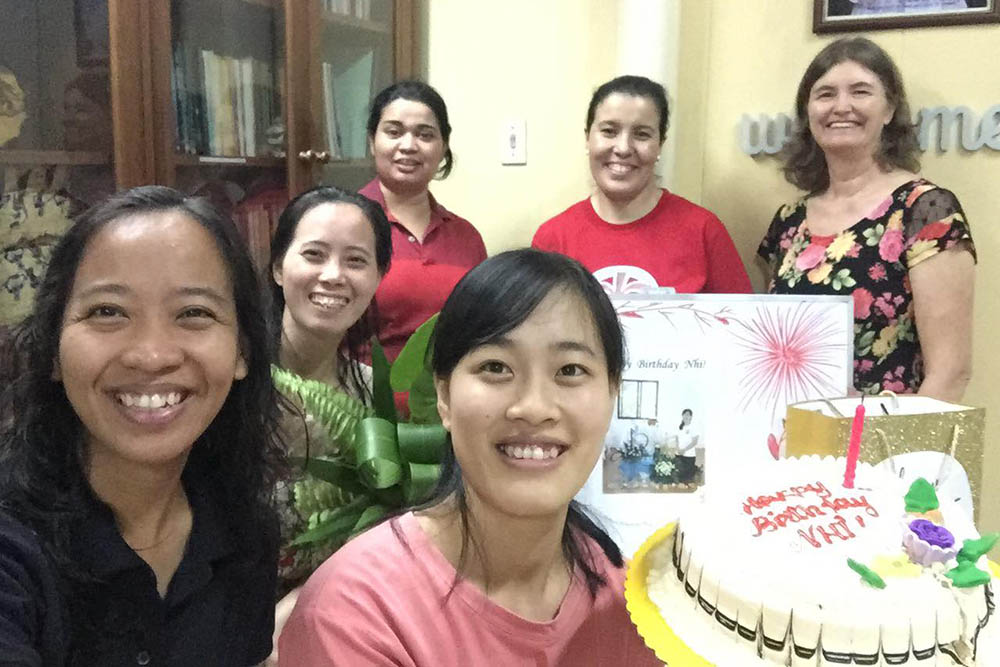
Our community celebrates the birthday of a Vietnamese sister. (Courtesy of Jennibeth Sabay)
Growing up, I never desired to live in a foreign land or a different country. True enough, I haven't been in another country yet. However, I am living with people from different countries. Though I am in my own country, the Philippines, I am surrounded by people of different races and cultural backgrounds.
It has been seven years since I began living in an international religious community, two years of which were as a professed sister; currently, I am a member of a community of six sisters, of five different nationalities: Pakistani, Vietnamese, Brazilian, Mexican and Filipino.
I didn't choose my community to which I was assigned. As with our families — we didn't choose them. Community members, like our families, are God's gift to us and so are we to them.
Community life is a gift. It is a space to grow and practice charity, love and other virtues. Community life involves a relationship with other disciples of Jesus. We hold on to our belief that it is God who called each one of us to be together, and we responded. Our constitutions say that the spirit of faith makes us recognize in each sister a gift of God for us: that we are called to love one another as God loved them and loves them still.
One of the modules of our online intercongregational modular formation class for juniors is on community life and interculturality. In that one, Franciscan Fr. Prisco Cajes said that intercultural living is an intentional and explicitly a faith-based undertaking. It is a deliberate decision and a genuine commitment. It is unnatural, far from easy, but God's grace makes it possible.
Living in an international community has allowed me to discover similarities and differences of each person and their culture. We share the same faith in Jesus Christ, striving to live the Gospel values, trying to be more welcoming and accepting of one another.
However, it is a challenge too, for it is not easy to deal with different personalities and people of varied cultures. Clashing personalities, conflicts and arguments, attitude problems and misunderstandings are inevitable.
In my few years living in an intercultural community, I have encountered challenges and difficulties. One is the challenge of letting go of my biases and judgments. Community living entails awareness of one's cultural baggage that hinders community relationships. This baggage includes our personal biases — not only about cultures different from ours, but also our judgment and fixed ideas.
The diverse languages of the community members also pose a challenge. I remember during my early years of formation, I felt upset when my sisters would speak their own language around me. The need to be sensitive to one another is important in community living.
Closed-mindedness, inability to accept differences, inflexibility, inability to listen, lack of charity, insensitivity and judgmental attitudes also hinder growth in community.
Advertisement
Community is not a finished product; instead, it is continuously built and sustained by each member. It takes the participation of every member to build loving relationships.
A community can be strengthened and sustained with prayer. The Vatican document "Fraternal Life in Community" says that communal prayer is "considered the foundation of all community life," contemplating God's mystery in significant moments as well as ordinary realities of our communities. It "reaches its full effectiveness when it is intimately linked to personal prayer." Common prayer and personal prayer are closely related and are complementary to each other.
In addition to prayer, communication — involving dialogue and listening — builds up bonds in community. Without effective communication, a community will not survive.
In dialogue, members get to know one another on a deep level. Listening is not just being quiet but being attentive and present to the other person. Conflicts arise when people fail to listen to one another.
I have more reasons to be thankful for my experience of community life. Here are three:
First, it strengthened my faith in God and made me more appreciative of God's work. I am still amazed at how we are able to live together despite differences. It is only God's grace that makes it possible.
Second, it provided me a space for growth. The sisters in my community taught me lessons. I also learned more about myself and areas in which I need to improve, as I related to my community members. Learning is a lifelong process and is possible only in relation with others.
Finally, it made me experience God's love, care and mercy. The simple gestures, affection and words of encouragement from my sisters in community strengthen and inspire me in challenging times. The community accepts me as I am with all my weaknesses and limitations.
Community life has not been spared from the effects of the COVID-19 pandemic. However, this pandemic gave our community more time to be together. Because of the health restrictions, we are mostly in the house especially during lockdown time. This pandemic challenged us to be more considerate, sensitive and caring of one another.
I experienced the love and care of my community when I actually got the COVID-19 infection, and the sisters in my community took good care of me, providing everything I needed. They were instrumental to my recovery and healing.
Community life is indeed a gift. It has challenges and difficulties but it is sustained by the commitment and deliberate choice of each member, and above all with God's grace. Prayer and communication strengthens the bond of community. And it is in community that we support and love one another "in God and for God," as our foundress St. Emilie de Villeneuve would say.







